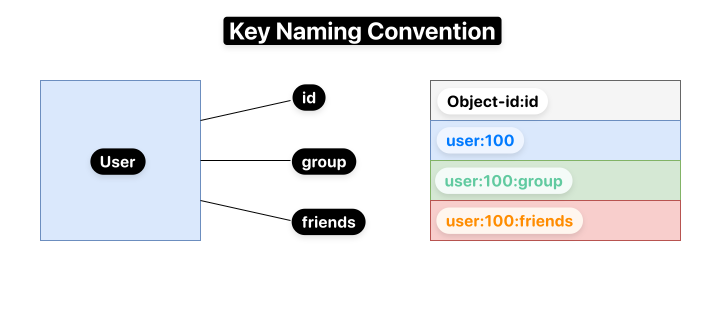Redis Data Management
Redis Data Management
- Redis uses a key-based data structure.
- It belongs to the family of databases called
key-value stores. - Data is stored as
key = value. - Values can be:
- String
- List
- Hash
- Set
- And more…
- You can only retrieve data if you know the exact
keyused to store it.
Commands
Keys Naming Conventions
- Keep it simple but robust: Choose clear and meaningful names for your keys.
- Avoid very short keys: They can be unclear and hard to manage.
- Use a logical schema: Design your key names based on your database structure. For example, use
object-id:id. - Maximum key size: Keys can be up to 512MB in size.
- Binary safe: Redis keys can be any binary sequence, meaning they can include any characters.
- Empty string: An empty string is also a valid key in Redis.
❯ Set key
❯ Syntax: set [key] [value]
1
2
127.0.0.1:6379> set cloudsimplify:user:100:name github
OK
❯ Get key
❯ Syntax: get [key]
1
2
127.0.0.1:6379> get cloudsimplify:user:100:name
"github"
❯ Delete keys (Integer 1 means operation was successful)
❯ Syntax: del [key...]
1
2
127.0.0.1:6379> del cloudsimplify:user:100:name
(integer) 1
❯ Check if a key exists or not (Integer 0 means key not exists)
❯ Syntax: exists [key...]
1
2
3
4
5
6
7
8
127.0.0.1:6379> set cloudsimplify:user:100:name github
OK
127.0.0.1:6379> exists cloudsimplify:user:100:name
(integer) 1
127.0.0.1:6379> del cloudsimplify:user:100:name
(integer) 1
127.0.0.1:6379> exists cloudsimplify:user:100:name
(integer) 0
How Redis Handles Key Expirations?
- Normal keys: These are created without any expiration time.
- Expired keys: These have expiration information stored as a Unix timestamp (in milliseconds).
Redis expires keys in two ways:
- Passive Expiration:
- A key expires passively when a client tries to access it and it’s found to have timed out.
- Active Expiration:
- Redis actively checks for expired keys 10 times per second by:
- Testing 20 random keys that have expiration times.
- Deleting any keys that are found to be expired.
- If more than 25% of the tested keys are expired, Redis repeats the process.
- Redis actively checks for expired keys 10 times per second by:
❯ Define key with expiration
❯ Syntax: set [key] [value] ex [ttl]
1
2
127.0.0.1:6379> set cloudsimplify:user:100:password secretpasswd ex 86400
OK
❯ Check ttl on key in sec
❯ Syntax: ttl [key]
1
2
127.0.0.1:6379> ttl cloudsimplify:user:100:password
(integer) 86252
❯ Set expiration on key in sec
❯ Syntax: expire [key] [ttl]
1
2
3
4
127.0.0.1:6379> expire cloudsimplify:user:100:password 300
(integer) 1
127.0.0.1:6379> ttl cloudsimplify:user:100:password
(integer) 297
❯ Set expiration on key in ms
❯ Syntax: pexpire [key] [ttl(ms)]
1
2
127.0.0.1:6379> pexpire cloudsimplify:user:100:password 300000
(integer) 1
❯ Check ttl on key in ms
❯ Syntax: pttl [key]
1
2
127.0.0.1:6379> pttl cloudsimplify:user:100:password
(integer) 297541
❯ Sets the string value and expiration time of a key. Creates the key if it doesn’t exist
❯ Syntax: setex [key] [ttl] [value]
1
2
3
4
127.0.0.1:6379> setex cloudsimplify:user:100:password 300 secretpasswd
OK
127.0.0.1:6379> ttl cloudsimplify:user:100:password
(integer) 297
❯ Sets both string value and expiration time in milliseconds of a key. The key is created if it doesn’t exist
❯ Syntax: psetex [key] [ttl(ms)] [value]
1
2
3
4
5
6
7
127.0.0.1:6379> psetex cloudsimplify:user:100:password 300000 secretpasswd
OK
127.0.0.1:6379> pttl cloudsimplify:user:100:password
(integer) 296337
127.0.0.1:6379> ttl cloudsimplify:user:100:password
(integer) 294
127.0.0.1:6379>
❯ Remove the expiration from the key (Integer 1 means expiration removed)
❯ Syntax: persist [key]
1
2
3
4
5
6
7
8
127.0.0.1:6379> setex cloudsimplify:user:100:token 300 sometoken
OK
127.0.0.1:6379> ttl cloudsimplify:user:100:token
(integer) 287
127.0.0.1:6379> persist cloudsimplify:user:100:token
(integer) 1
127.0.0.1:6379> ttl cloudsimplify:user:100:token
(integer) -1
Key Spaces
- Key Spaces in Redis: These are similar to database namespaces or schemas.
- You can have the same key name in different key spaces.
- You can manage keys separately in each key space.
- Key spaces are indexed starting from 0.
- Use the command
select [index]to choose a key space. - This allows you to
select,get, and control different parts of the database independently.
❯ Select key space
❯ Syntax: select [index]
1
2
3
4
5
6
7
8
9
10
11
12
13
14
15
16
127.0.0.1:6379> set name cloudsimplify
OK
127.0.0.1:6379> get name
"cloudsimplify"
127.0.0.1:6379> select 1
OK
127.0.0.1:6379[1]> get name # You're now in key space index #1
(nil)
127.0.0.1:6379[1]> set name github
OK
127.0.0.1:6379[1]> get name
"github"
127.0.0.1:6379[1]> select 0
OK
127.0.0.1:6379> get name
"cloudsimplify"
Key Patterns Matching
- Key Patterns:
h?llomatcheshello,hallo, andhxllo.h*llomatcheshlloandheeeello.h[ae]llomatcheshelloandhallo, but nothillo.h[^e]llomatcheshallo,hbllo, etc., but nothello.h[a-b]llomatcheshalloandhbllo.
- Performance:
- Redis can scan a database with 1 million keys in 40 milliseconds on an entry-level laptop.
- Usage Considerations:
- Use the
KEYScommand with extreme care in production environments, as it can severely impact performance when used on large databases. - Consider using the
SCANcommand as an alternative.
- Use the
❯ Get all available keys
❯ Syntax: keys *
1
2
3
4
5
6
7
8
9
10
11
12
13
14
15
16
17
18
19
20
21
22
23
24
25
26
27
28
29
30
31
32
33
34
35
36
37
38
39
40
41
42
43
127.0.0.1:6379> set hello 1
OK
127.0.0.1:6379> set hillo 2
OK
127.0.0.1:6379> set hallo 3
OK
127.0.0.1:6379> set hbllo 4
OK
127.0.0.1:6379> set hllo 5
OK
127.0.0.1:6379> set heeello 6
OK
127.0.0.1:6379> keys *
1) "hillo"
2) "hllo"
3) "hallo"
4) "hbllo"
5) "hello"
6) "heeello"
127.0.0.1:6379> keys h?llo
1) "hillo"
2) "hallo"
3) "hbllo"
4) "hello"
127.0.0.1:6379> keys * h*llo
(error) ERR wrong number of arguments for 'keys' command
127.0.0.1:6379> keys h*llo
1) "hillo"
2) "hllo"
3) "hallo"
4) "hbllo"
5) "hello"
6) "heeello"
127.0.0.1:6379> keys h[ae]llo
1) "hallo"
2) "hello"
127.0.0.1:6379> keys h[^e]llo
1) "hillo"
2) "hallo"
3) "hbllo"
127.0.0.1:6379> keys h[a-b]llo
1) "hallo"
2) "hbllo"
❯ Renames a key and overwrites the destination.
❯ Syntax: rename [key] [newkey]
1
2
3
4
5
6
7
8
9
10
11
12
13
14
15
16
17
18
127.0.0.1:6379> set fname cloudsimplify
OK
127.0.0.1:6379> set lname me
OK
127.0.0.1:6379> rename fname newfname
OK
127.0.0.1:6379> get fname
(nil)
127.0.0.1:6379> get newfname
"cloudsimplify"
127.0.0.1:6379> set fname github
OK
127.0.0.1:6379> get fname
"github"
127.0.0.1:6379> rename newfname fname # If newkey already exists it is overwritten, when this happens RENAME executes an implicit DEL operation
OK
127.0.0.1:6379> get fname # fname is now overwritten to newfname value
"cloudsimplify"
❯ Renames a key only when the target key name doesn’t exist.
❯ Syntax: renamenx [key] [newkey]
1
2
3
4
5
6
7
8
9
10
11
12
13
14
15
16
127.0.0.1:6379> set fname cloudsimplify
OK
127.0.0.1:6379> set lname me
OK
127.0.0.1:6379> renamenx fname newfname
(integer) 1
127.0.0.1:6379> get fname
(nil)
127.0.0.1:6379> get newfname
"cloudsimplify"
127.0.0.1:6379> set fname github
OK
127.0.0.1:6379> renamenx newfname fname # returns an error cause key fname exist
(integer) 0
127.0.0.1:6379> get fname
"github"
❯ Asynchronously deletes one or more keys
❯ Syntax: unlink [key...]
1
2
3
4
5
6
7
8
9
10
11
12
13
14
127.0.0.1:6379> set k1 v1
OK
127.0.0.1:6379> set k2 v2
OK
127.0.0.1:6379> set k3 v3
OK
127.0.0.1:6379> unlink k1 k2
(integer) 2
127.0.0.1:6379> get k1
(nil)
127.0.0.1:6379> get k2
(nil)
127.0.0.1:6379> get k3
"v3"
❯ Determines the type of value stored at a key
❯ Syntax: type [key]
1
2
3
4
5
6
7
8
9
10
11
12
13
14
15
16
127.0.0.1:6379> set k1 v1
OK
127.0.0.1:6379> lpush numbers 1 2 3 4 5
(integer) 5
127.0.0.1:6379> hset users fname cloudsimplify lname me
(integer) 2
127.0.0.1:6379> sadd cars mazda bmw audi
(integer) 3
127.0.0.1:6379> type k1
string
127.0.0.1:6379> type users
hash
127.0.0.1:6379> type numbers
list
127.0.0.1:6379> type cars
set

